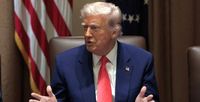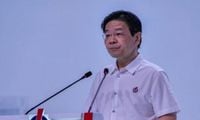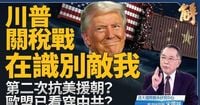U.S. President Donald Trump has expressed strong disapproval of Beijing's influence over the Panama Canal, asserting that trade partners may soon face a choice between the United States and China. During an interview with Fox News on April 15, 2025, Trump voiced his concerns regarding the current management of the canal and the extent of Chinese control in the region. He remarked, "We don’t like the way the Panama Canal is being managed right now, and we don’t like Beijing’s influence there." This statement came in the wake of Panama's decision to withdraw from China’s Belt and Road Initiative.
Trump further indicated that he would consider requiring countries to choose sides between the U.S. and China, stating, "Beijing’s influence seems to have diminished. A year ago, almost every flag and every statement at the Panama Canal was in Chinese." He emphasized, "We didn’t give the Panama Canal to China. We gave it to Panama." This statement underscores Trump's administration's ongoing efforts to reshape international trade dynamics.
The U.S. government is reportedly planning to leverage ongoing tariff negotiations to pressure trade partners into economically isolating China. According to sources cited by the Wall Street Journal, the administration aims to negotiate with over 70 countries to prevent them from allowing Chinese goods to transit through their territories, establish facilities to circumvent U.S. tariffs, or absorb cheap Chinese industrial products.
In a press briefing on April 15, White House Press Secretary Karoline Leavitt announced a new statement from Trump that suggested any agreement with China would not be reached quickly, saying, "Now the ball is in China’s court. They need to make a deal with us. We don’t have to make a deal with them." This reflects a more aggressive stance that positions the U.S. as unwilling to compromise without significant concessions from China.
Trump's remarks come at a time when the Chinese Communist Party (CCP) is actively engaging in trade diplomacy across Southeast Asia. Recently, Chinese leader Xi Jinping visited Vietnam, a crucial U.S. trade partner affected by tariffs, where he signed numerous economic commitments with the Vietnamese government. Interestingly, Vietnam has also indicated a desire to purchase substantial military equipment from the U.S. to help balance its trade deficit.
In a conversation with Trump following the announcement of equivalent tariffs, Vietnamese leader To Lam described their discussion as "fruitful" and extended an invitation for Trump to visit Vietnam. He expressed willingness to sign a bilateral tariff agreement that would reduce tariffs on U.S. goods to zero.
As the U.S.-China tariff battle escalates, the situation is becoming increasingly complex. The CCP has recently claimed that Trump is retreating from his aggressive tariff stance, with the White House announcing plans to raise tariffs on Chinese imports by 100%, reaching a maximum of 245%. This increase is in retaliation for previous CCP measures against U.S. tariffs.
Reports indicate that the CCP is also replacing its negotiation representatives in light of these developments. As part of a broader strategy, the CCP is shifting to a "wartime posture," actively contacting other countries, including U.S. allies, to build a coalition against U.S. tariffs. This approach aims to counteract the economic pressure exerted by the U.S. and mitigate the impact of tariffs on Chinese industries.
The ongoing trade war has raised concerns about the future of the Chinese economy, with officials warning of grim prospects and potential widespread unemployment. As the CCP grapples with domestic pressures, there are fears that significant job losses could lead to social unrest.
In Taiwan, discussions regarding tariff negotiations with the U.S. have gained traction, with analysts questioning the potential outcomes. The U.S. Trade Representative has been in talks with Taiwan, suggesting a positive trajectory for bilateral relations. Experts like Song Guocheng have highlighted the importance of maintaining a balanced trade system in light of the evolving geopolitical landscape.
The tension between the U.S. and China is no longer merely a cold war; it has evolved into what some analysts are calling an "ice war," characterized by strategic maneuvering and economic pressures. As both nations continue to navigate this complex relationship, the implications for global trade and diplomacy remain profound.
In summary, Trump's recent statements and actions reflect a significant shift in U.S. foreign policy, particularly regarding trade relations with China. As the U.S. seeks to assert its influence and reshape global trade dynamics, the choices made by other countries will be critical in determining the future landscape of international commerce.






